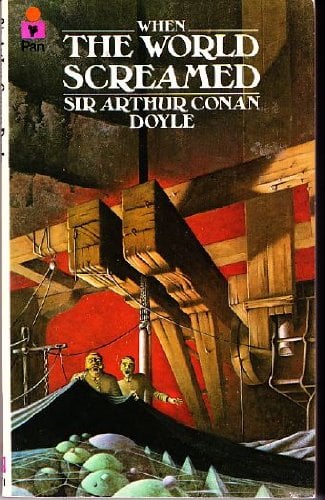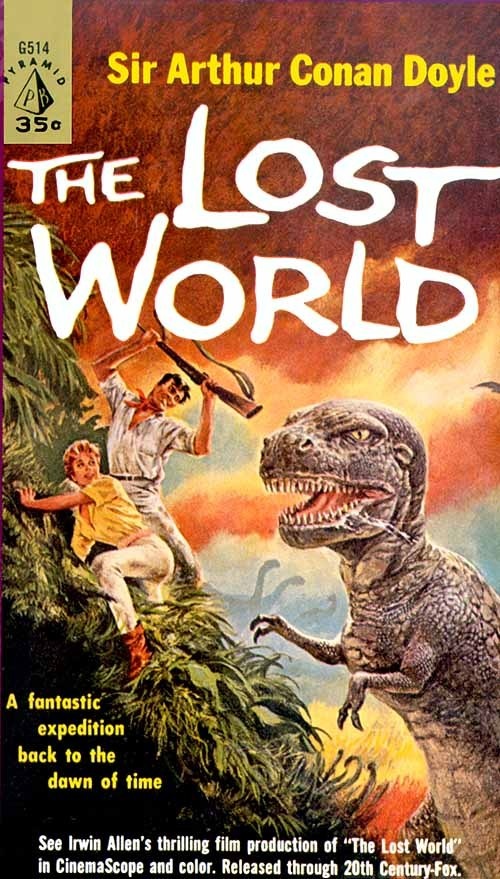When the World Screamed (2)
By:
September 21, 2015

Arthur Conan Doyle’s novella When the World Screamed was first published in 1928. The fifth and final Professor Challenger adventure, it takes us not outward (e.g., to a South American plateau crawling with dinosaurs), nor inward (e.g., to an airtight chamber, while the Earth passes through a poison belt), but instead downward. Challenger, here described as “a primitive cave-man in a lounge suit,” while also “the greatest brain in Europe,” proposes to drill his way from a tract of land in Sussex (England) eight miles beneath the planet’s epidermis. Why? In order to prove his hypothesis that the world is itself a living organism! Enjoy.
Malone’s arguments prevailed, and Friday morning found me on my way to Enmore Gardens, I took such particular care to be in time that I found myself at the door twenty minutes too soon. I was waiting in the street when it struck me that I recognized the Rolls-Royce with the silver arrow mascot at the door. It was certainly that of Jack Devonshire, the junior partner of the great Morden firm. I had always known him as the most urbane of men, so that it was rather a shock to me when he suddenly appeared, and standing outside the door he raised both his hands, to heaven and said with great fervour: ‘Damn him! Oh, damn him!’
‘What is up, Jack? You seem peeved this morning.’
‘Hullo, Peerless! Are you in on this job, too?’
‘There seems a chance of it.’
‘Well, you find it chastening to the temper.’
‘Rather more so than yours can stand, apparently.’
‘Well, I should say so. The butler’s message to me was: “The Professor desired me to say, sir, that he was rather busy at present eating an egg, and that if you would call at some more convenient time he would very likely see you.” That was the message delivered by a servant. I may add that I had called to collect forty-two thousand pounds that he owes us.’
I whistled.
‘You can’t get your money?’
‘Oh, yes, he is all right about money. I’ll do the old gorilla the justice to say that he is open-handed with money. But he pays when he likes and how he likes, and he cares for nobody. However, you go and try your luck and see how you like it.’ With that he flung himself into his motor and was off.
I waited with occasional glances at my watch until the zero hour should arrive. I am, if I may say so, a fairly hefty individual, and a runner-up for the Belsize Boxing Club middle-weights, but I have never faced an interview with such trepidation as this. It was not physical, for I was confident I could hold my own if this inspired lunatic should attack me, but it was a mixture of feelings in which fear of some public scandal and dread of losing a lucrative contract were mingled. However, things are always easier when imagination ceases and action begins. I snapped up my watch and made for the door.
It was opened by an old wooden-faced butler, a man who bore an expression, or an absence of expression, which gave the impression that he was so inured to shocks that nothing on earth would surprise him.
‘By appointment, sir?’ he asked.
‘Certainly.’
He glanced at a list in his hand.
‘Your name, sir?… Quite so, Mr. Peerless Jones…. Ten-thirty. Everything is in order. We have to be careful, Mr. Jones, for we are much annoyed by journalists. The Professor, as you may be aware, does not approve of the Press. This way, sir. Professor Challenger is now receiving.’

The next instant I found myself in the presence. I believe that my friend, Ted Malone, has described the man in his ‘Lost World’ yarn better than I can hope to do, so I’ll leave it at that. All I was aware of was a huge trunk of a man behind a mahogany desk, with a great spade-shaped black beard and two large grey eyes half covered with insolent drooping eyelids. His big head sloped back, his beard bristled forward, and his whole appearance conveyed one single impression of arrogant intolerance. ‘Well, what the devil do you want?’ was written all over him. I laid my card on the table.
‘Ah yes,’ he said, picking it up and handling it as if he disliked the smell of it. ‘Of course. You are the expert so-called. Mr. Jones — Mr. Peerless Jones. You may thank your godfather, Mr. Jones, for it was this ludicrous prefix which first drew my attention to you.’
‘I am here, Professor Challenger, for a business interview and not to discuss my own name,’ said I, with all the dignity I could master.
‘Dear me, you seem to be a very touchy person, Mr. Jones. Your nerves are in a highly irritable condition. We must walk warily in dealing with you, Mr. Jones. Pray sit down and compose yourself. I have been reading your little brochure upon the reclaiming of the Sinai Peninsula. Did you write it yourself?’
‘Naturally, sir. My name is on it.’
‘Quite so! Quite so! But it does not always follow, does it? However, I am prepared to accept your assertion. The book is not without merit of a sort. Beneath the dullness of the diction one gets glimpses of an occasional idea. There are germs of thought here and there. Are you a married man?’
‘No, sir. I am not.’
‘Then there is some chance of your keeping a secret.’
‘If I promised to do so, I would certainly keep my promise.’
‘So you say. My young friend, Malone’ — he spoke as if Ted were ten years of age — ‘has a good opinion of you. He says that I may trust you. This trust is a very great one, for I am engaged just now in one of the greatest experiments — I may even say the greatest experiment — in the history of the world. I ask for your participation.’
‘I shall be honoured.’
‘It is indeed an honour. I will admit that I should have shared my labours with no one were it not that the gigantic nature of the undertaking calls for the highest technical skill. Now, Mr. Jones, having obtained your promise of inviolable secrecy, I come down to the essential point. It is this — that the world upon which we live is itself a living organism, endowed, as I believe, with a circulation, a respiration, and a nervous system of its own.’
Clearly the man was a lunatic.
RADIUM AGE SCIENCE FICTION: “Radium Age” is HILOBROW’s name for the 1904–33 era, which saw the discovery of radioactivity, the revelation that matter itself is constantly in movement — a fitting metaphor for the first decades of the 20th century, during which old scientific, religious, political, and social certainties were shattered. This era also saw the publication of genre-shattering writing by Edgar Rice Burroughs, Sax Rohmer, E.E. “Doc” Smith, Jack London, Arthur Conan Doyle, Aldous Huxley, Olaf Stapledon, Karel Čapek, H.P. Lovecraft, Charlotte Perkins Gilman, Yevgeny Zamyatin, Philip Gordon Wylie, and other pioneers of post-Verne/Wells, pre-Golden Age “science fiction.” More info here.
READ GORGEOUS PAPERBACKS: HiLoBooks has reissued the following 10 obscure but amazing Radium Age science fiction novels in beautiful print editions: Jack London’s The Scarlet Plague, Rudyard Kipling’s With the Night Mail (and “As Easy as A.B.C.”), Arthur Conan Doyle’s The Poison Belt, H. Rider Haggard’s When the World Shook, Edward Shanks’ The People of the Ruins, William Hope Hodgson’s The Night Land, J.D. Beresford’s Goslings, E.V. Odle’s The Clockwork Man, Cicely Hamilton’s Theodore Savage, and Muriel Jaeger’s The Man with Six Senses. For more information, visit the HiLoBooks homepage.
SERIALIZED BY HILOBOOKS: Jack London’s The Scarlet Plague | Rudyard Kipling’s With the Night Mail (and “As Easy as A.B.C.”) | Arthur Conan Doyle’s The Poison Belt | H. Rider Haggard’s When the World Shook | Edward Shanks’ The People of the Ruins | William Hope Hodgson’s The Night Land | J.D. Beresford’s Goslings | E.V. Odle’s The Clockwork Man | Cicely Hamilton’s Theodore Savage | Muriel Jaeger’s The Man With Six Senses | Jack London’s “The Red One” | Philip Francis Nowlan’s Armageddon 2419 A.D. | Homer Eon Flint’s The Devolutionist | W.E.B. DuBois’s “The Comet” | Edgar Rice Burroughs’s The Moon Men | Charlotte Perkins Gilman’s Herland | Sax Rohmer’s “The Zayat Kiss” | Eimar O’Duffy’s King Goshawk and the Birds | Frances Hodgson Burnett’s The Lost Prince | Morley Roberts’s The Fugitives | Helen MacInnes’s The Unconquerable | Geoffrey Household’s Watcher in the Shadows | William Haggard’s The High Wire | Hammond Innes’s Air Bridge | James Branch Cabell’s Jurgen | John Buchan’s “No Man’s Land” | John Russell’s “The Fourth Man” | E.M. Forster’s “The Machine Stops” | John Buchan’s Huntingtower | Arthur Conan Doyle’s When the World Screamed | Victor Bridges’ A Rogue By Compulsion | Jack London’s The Iron Heel | H. De Vere Stacpoole’s The Man Who Lost Himself | P.G. Wodehouse’s Leave It to Psmith | Richard Connell’s “The Most Dangerous Game” | Houdini and Lovecraft’s “Imprisoned with the Pharaohs” | Arthur Conan Doyle’s “The Sussex Vampire.”
